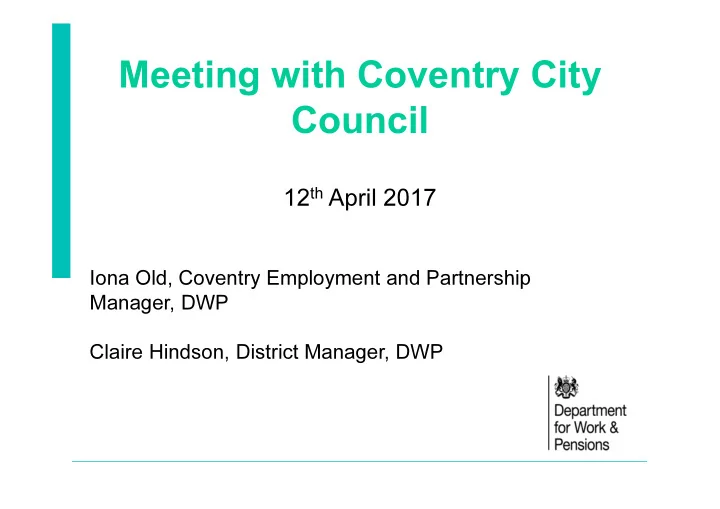

Meeting with Coventry City Council 12 th April 2017 Iona Old, Coventry Employment and Partnership Manager, DWP Claire Hindson, District Manager, DWP
2017/18 • Our purpose and our challenge • Manifesto commitment on the labour market • How partnership work is supporting our aims
Employment Rates • The Unemployment Rate has fallen to 4.7% the lowest since 2005 • Coventry have 4,430 claiming work intensive benefits, 855 who are 18-24 • Change since 2010 • -7,198 claimants, 2,550 who are 18-24
Jobcentre Plus Offer • Universal Job match • A named Jobcentre Plus contact with experience of recruitment in the local area • Attraction campaigns and opportunities to get involved in local events • Links into the local community via our network of Partners • Opportunity to recruit via a sector specific route-way • Offer work experience to a local person • Work Trials
Universal Credit
Benefit Cap • Numbers in Coventry • Action with partners • Support moving forward
Disability Confident Increase your confidence in recruiting and retaining people with disabilities • 7m people of working age population have a disability (17.5%) • 1.3m of them want to work • Only 50% of working age disabled people are in work compared with 80% of non disabled • Disabled people spend £80 billion per year in UK.
New Disability Confident Scheme Government working with employers to: • increase understanding of disability • challenge attitudes towards disability • remove barriers to disabled people and those with long term health conditions in employment • ensure that disabled people have the opportunities to fulfil their potential and realise their aspirations.
Jobcentre Plus Support • Disability Employment Advisers • Work Choice • Access to Work
Access to Work • Access to Work (AtW) was introduced in June 1994 • It is a National programme delivered by Department for Work & Pensions. • To help overcome barriers that disabled people come across in when moving onto or retaining employment. • Provides a grant to cover additional costs over and above the requirements of making “reasonable adjustments” which and employer is legally obliged to provide under the “Equality Act 2010”. • A flexible programme that focuses on the needs of the individual.
Benefits of Access to Work • Encourages greater independence • Promotes work as being the best route to inclusion for disabled people • Enables disabled people to work on a more equal basis with no disabled colleagues • Encourages employers to recruit and retain disabled people by offering practical help • Provides advice to disabled people and their employers.
Eligibility Criteria • Have a disability or health condition that has a long term, adverse affect on their ability to carry out their job • Be over 16 years old • Be in, or about to start, paid employment (including self employment) • Live and work in England, Scotland or Wales • Not be claiming Incapacity Benefit or ESA once they are in work (with the exception of higher permitted work)
Types of Help There are seven main elements within Access to Work: • Special Aids and Equipment (SAE) • Adaptations to Premises and equipment (APE) • Travel to Work (TtW) • Travel in Work (TiW) • Support Worker (SW) • Communication Support at Interview (CSI) • Mental Health Support Service (MHSS)
Mental Health Support Service • Going into work • Absent from work as a result of a mental health condition • Finding work difficult as a result of a mental health condition The support available from Access to Work includes: • An assessment of needs • A personalised six month support plan, with detailed steps designed to keep a person in, or help them to return to work • Signposting to relevant intervention and support services This service is provided for Access to Work by Remploy
Examples of Mental Health Support Coping strategies This could cover a range of strategies and will depend on the individual’s job role, their condition and how this impacts their work. For example: • Keeping a mood diary • Using memory aids such as Mind Maps, checklists • Relaxation techniques when under pressure • Developing a Wellbeing Recovery Action Plan • Cognitive Behavioural techniques Reasonable adjustments • Development of Flexible working, phased return, etc. • Putting in place a buddy or mentor • Temporary reduction in targets or reallocation • Additional time to complete certain aspects of job role • Regular formalised 121 meetings to review concerns
Access to Work Grants The level of grant will depend on: • Whether the applicant is employed or self employed. • How long they have been in their job. • The type of help required. • The size of company. Access to Work provides the grant with which to procure the support that is needed, it does not provide the support itself.
Working in Partnership • Support for Schools • Troubled Families
Support for Schools Ernsford Grange – year 9+ Offering Employer skills sessions Hereward College – working in partnership with In2ambition Sidney Stringer – In conversation Success in generating leads in Warwickshire
Troubled Families Support • Troubled Families is a programme of targeted-intervention for families with multiple problems, including crime, anti-social behaviour, mental health problems, domestic abuse and unemployment. • Local authorities identify ‘troubled families’ in their area and usually assign a key worker to act as a single point of contact. Central Government pays local authorities by results for each family they ‘turn around’. Progress to work and moving into employment are two key goals • Coventry City Council work in partnership with JCP with a target of engaging with families within
Departmental objectives • Roll out of UC, Coventry will be April 2018 • Achieving the highest employment rate in the G7 • Halving the disability employment gap • Delivering support in schools
Recommend
More recommend